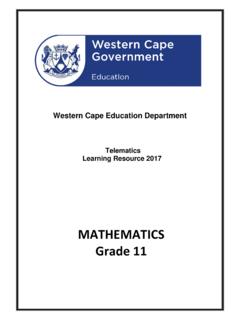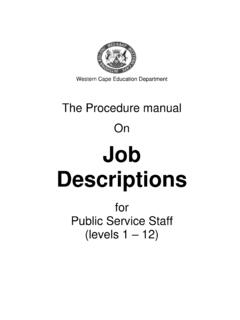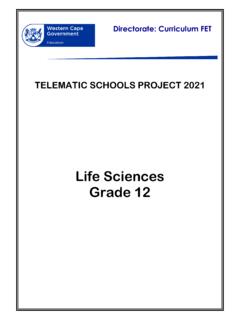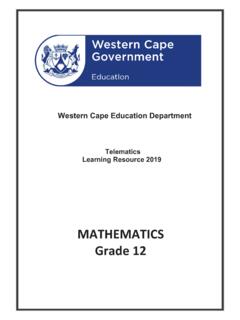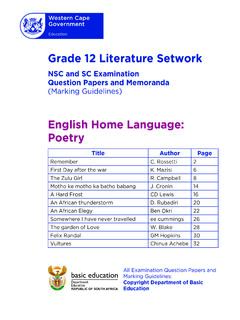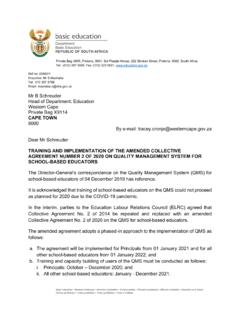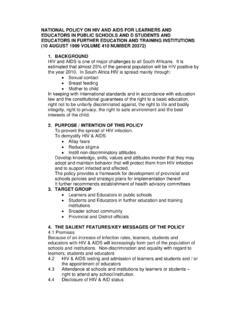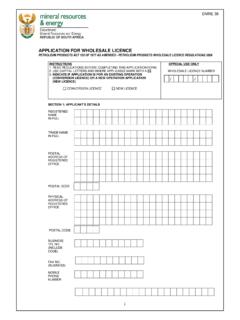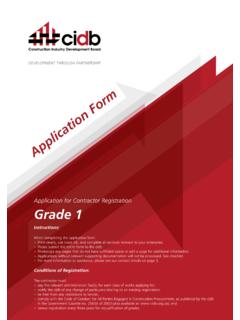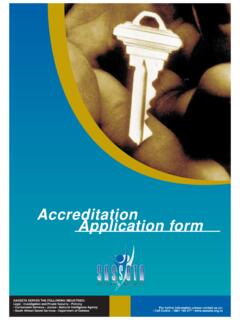Transcription of SOUTH AFRICAN SCHOOLS ACT NO. 84 OF 1996 - Western …
1 SOUTH AFRICAN SCHOOLS ACT NO. 84 OF 1996 [View Regulation] [ASSENTED TO 6 NOVEMBER, 1996] [DATE OF COMMENCEMENT: 1 JANUARY, 1997] (Unless otherwise indicated) (English text signed by the President) This Act has been updated to Government Gazette 34620 dated 19 September, 2011. as amended by Education Laws Amendment Act, No. 100 of 1997 Education Laws Amendment Act, No. 48 of 1999 Education Laws Amendment Act, No. 53 of 2000 Education Laws Amendment Act, No. 57 of 2001 Education Laws Amendment Act, No. 50 of 2002 Education Laws Amendment Act, No. 1 of 2004 Education Laws Amendment Act, No. 24 of 2005 Education Laws Amendment Act, No. 31 of 2007 Basic Education Laws Amendment Act, No. 15 of 2011 ACT To provide for a uniform system for the organisation, governance and funding of SCHOOLS ; to amend and repeal certain laws relating to SCHOOLS ; and to provide for matters connected therewith.
2 Preamble. WHEREAS the achievement of democracy in SOUTH Africa has consigned to history the past system of education which was based on racial inequality and segregation; and WHEREAS this country requires a new national system for SCHOOLS which will redress past injustices in educational provision, provide an education of progressively high quality for all learners and in so doing lay a strong foundation for the development of all our people s talents and capabilities, advance the democratic transformation of society, combat racism and sexism and all other forms of unfair discrimination and intolerance, contribute to the eradication of poverty and the economic well-being of society, protect and advance our diverse cultures and languages, uphold the rights of all learners, parents and educators.
3 And promote their acceptance of responsibility for the organisation, governance and funding of SCHOOLS in partnership with the State; and WHEREAS it is necessary to set uniform norms and standards for the education of learners at SCHOOLS and the organisation, governance and funding of SCHOOLS throughout the Republic of SOUTH Africa; ARRANGEMENT OF SECTIONS CHAPTER 1 DEFINITIONS AND APPLICATION OF ACT 1. Definitions 2. Application of Act CHAPTER 2 LEARNERS 3. Compulsory attendance 4. Exemption from compulsory attendance 5. Admission to public SCHOOLS 5A. Norms and standards for basic infrastructure and capacity in public SCHOOLS 6. Language policy of public SCHOOLS 6A. Curriculum and assessment 6B. Non-discrimination in respect of official languages 7.
4 Freedom of conscience and religion at public SCHOOLS 8. Code of conduct 8A. Random search and seizure and drug testing at SCHOOLS 9. Suspension and expulsion from public school 10. Prohibition of corporal punishment 10A. Prohibition of initiation practices 11. Representative council of learners CHAPTER 3 PUBLIC SCHOOLS 12. Provision of public SCHOOLS 12A. Merger of public SCHOOLS 13. Public SCHOOLS on State property 14. Public SCHOOLS on private property 15. Status of public SCHOOLS 16. Governance and professional management of public SCHOOLS 16A. Functions and responsibilities of principal of public school 17. Governing body serving two or more SCHOOLS 18. Constitution of governing body 18A. Code of conduct of governing body 19. Enhancement of capacity of governing bodies 20.
5 Functions of all governing bodies 21. Allocated functions of governing bodies 22. Withdrawal of functions from governing bodies 23. Membership of governing body of ordinary public school 24. Membership of governing body of public school for learners with special education needs 25. Failure by governing body to perform functions 26. Recusal by members of governing body 27. Reimbursement of members of governing body 28. Election of members of governing body 29. Office-bearers of governing bodies 30. Committees of governing body 31. Term of office of members and office-bearers of governing bodies 32. Status of minors on governing bodies of public SCHOOLS 33. Closure of public SCHOOLS 33A. Prohibition of political activities during school time CHAPTER 4 FUNDING OF PUBLIC SCHOOLS 34.
6 Responsibility of State 35. Norms and standards for school funding 36. Responsibility of governing body 37. school funds and assets of public SCHOOLS 38. Annual budget of public school 38A. Prohibition of payment of unauthorised remuneration, or giving of financial benefit or benefit in kind to certain employees 39. school fees at public SCHOOLS 40. Parent s liability for payment of school fees 41. Enforcement of payment of school fees 42. Financial records and statements of public SCHOOLS 43. Audit or examination of financial records and statements 44. Financial year of public school CHAPTER 5 INDEPENDENT SCHOOLS 45. Establishment of independent school 45A. Admission age to independent school 46. Registration of independent school 47.
7 Withdrawal of registration of independent school 48. Subsidies to registered independent SCHOOLS 49. Declaration of independent school as public school 50. Duties of Member of Executive Council relating to independent SCHOOLS 51. Registration of learner for education at home CHAPTER 6 TRANSITIONAL PROVISIONS 52. Transitional provisions relating to SCHOOLS other than private SCHOOLS 53. Transitional provisions relating to private SCHOOLS 55. Transitional provisions relating to immovable property of certain SCHOOLS 56. Transitional provisions relating to public SCHOOLS on private property 57. Transitional provisions relating to private property owned by religious organisation CHAPTER 7 GENERAL PROVISIONS 58. Expropriation 58A. Alienation of assets of public school 58B.
8 Identification of underperforming public SCHOOLS 58C. Compliance with norms and standards 59. Duty of SCHOOLS to provide information 60. Liability of State 61. Regulations 62. Delegation of powers 63. Repeal and amendment of laws 64. Short title and commencement Schedule 1. Schedule 2. Amendment of Educators Employment Act, 1994, by section 63 CHAPTER 1 DEFINITIONS AND APPLICATION OF ACT 1. Definitions. (1) In this Act, unless the context indicates otherwise Constitution means the Constitution of the Republic of SOUTH Africa, 1996 (Act No. 108 of 1996); [Definition of Constitution substituted by s. 1 (b) of Act No. 100 of 1997.] Wording of Sections Council of Education Ministers means the Council of Education Ministers established by the National Education Policy Act, 1996 (Act No.)
9 27 of 1996); dangerous object means (a) any explosive material or device; (b) any firearm or gas weapon; (c) any article, object or instrument that may be employed to cause bodily harm to a person or damage to property, or to render a person temporarily paralysed or unconscious; or (d) any object that the Minister may, by notice in the Gazette, declare to be a dangerous object for the purpose of this Act; [Definition of dangerous object inserted by s. 4 (a) of Act No. 31 of 2007.] education department means the department established by section 7 (2) of the Public Service Act, 1994 (Proclamation No. 103 of 1994), which is responsible for education in a province; educator means any person, excluding a person who is appointed to exclusively perform extracurricular duties, who teaches, educates or trains other persons or who provides professional educational services, including professional therapy and education psychological services, at a school ; [Definition of educator substituted by s.]
10 6 (a) of Act No. 48 of 1999.] Wording of Sections governing body means a governing body contemplated in section 16 (1); grade means that part of an educational programme which a learner may complete in one school year, or any other education programme which the Member of the Executive Council may deem to be equivalent thereto; Head of Department means the head of an education department; illegal drug means (a) any unlawful substance that has a psychological or physiological effect; or (b) any substance having such effect that is possessed unlawfully; [Definition of illegal drug inserted by s. 4 (b) of Act No. 31 of 2007.] independent school means a school registered or deemed to be registered in terms of section 46; learner means any person receiving education or obliged to receive education in terms of this Act; loan means any financial obligation based on agreement, which obligation renders a school liable for making payment, in one or more instalments, in favour of any person, but does not include the payment of staff appointed by the governing body in terms of section 20 (4) or (5); [Definition of loan inserted by s.

